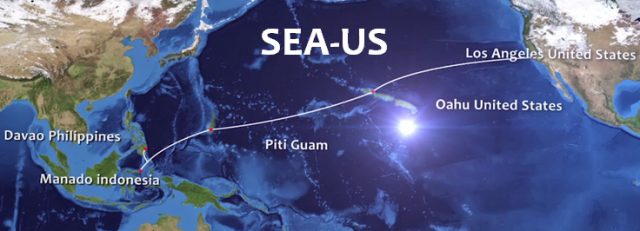Davao City Mayor Sara Duterte-Carpio has acknowledged as “a mark of excellence in service to the Filipinos” the $250-million Globe Southeast Asia-United States (SEA-US) submarine cable system which directly connects the Philippines to the United States through Davao City.
“This is the first in our country and we are more than thrilled that the Cable Landing Station is installed in Talomo, Davao City. Stable connectivity has long been coveted by Filipinos and this breakthrough merits our approbation,” Duterte said in a message sent to Globe.
Expanding in a clever route and bypassing earthquake zones, Duterte noted that the state-of-the-art technology paves the way to faster data transmission which “will not only be a chorus of cheers for BPOs and ICT companies but for all industries benefitting from telecommunications.”
The 14,500-kilometer undersea cable uses the latest 100 gigabits per second transmission technology to deliver an additional 20 terabits per second capacity. The additional capacity will cater to the exponential growth of bandwidth between the two continents.
The facility also supports ongoing efforts of Globe to further enhance its services in Mindanao such as the establishment of a data center in Davao City designed to address the growing information and communications technology requirements of major industries in the region.
“On behalf of the City Government of Davao, I would like to express my felicitations to Globe for this brilliant initiative of creating a nexus between the Philippines, the US, Guam, and Indonesia. We applaud you for this feat – a mark of the expansion of your horizons, a mark of excellence in service to the Filipinos,” she said.
To this, Globe President Ernest Cu said: “This will not be possible without the help of many agencies especially the local government unit in Davao. This project was started about five years ago with a commitment to provide faster transmission, more efficient connectivity and greater network resiliency in Mindanao and the rest of the country. The LGU gladly accepted it, facilitated all our permits, ensured the security of the project and in a certain degree, validated the location of the cable landing station and the future data center. Our business is growing very well in Davao and I’m sure that this added capacity will be put to good use.”
For the SEA-US cable system, Globe has invested USD80 million aside from the $750-million capital expenditure of the company this year to enhance its data capacities. The annual investment is being utilized for LTE deployment using the 700 Mhz, 1800 Mhz, and 2600 Mhz frequencies. With a more pervasive mobile LTE data, internet speeds have markedly improved based on international benchmarking studies.
The SEA – US Cable system adds another layer of redundancy to the Globe network since it uses a different route to directly link Asia to the US for faster data transmission, more efficient connectivity and greater network resiliency. The system bypasses congested, typhoon and earthquake-prone areas for business continuity.
The system was built by a consortium of 7 international telecommunications companies and links five regions that include Manado (Indonesia), Davao (Philippines), Piti (Guam), Oahu (Hawaii, United States), and Los Angeles (California, United States).
Press Release








